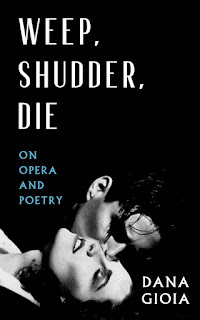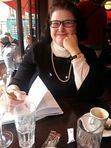Book Review: "Weep, Shudder, Die" by Dana Gioia
 I enjoy listening to, watching, and reading about opera. When I was little my grandparents--and later my parents--had the two volume Lincoln Library of Essential Information (not sure what edition) and it contained a section with synopses of all the major operas and I nearly memorized them. The plot to Meyerbeer's Les Huguenots shocked me and then I had to read about the Saint Bartholomew's Day Massacre! Probably in the Funk & Wagnalls encyclopedia.
I enjoy listening to, watching, and reading about opera. When I was little my grandparents--and later my parents--had the two volume Lincoln Library of Essential Information (not sure what edition) and it contained a section with synopses of all the major operas and I nearly memorized them. The plot to Meyerbeer's Les Huguenots shocked me and then I had to read about the Saint Bartholomew's Day Massacre! Probably in the Funk & Wagnalls encyclopedia.I've attended eight or so operatic performances, but I've watched many more on television and listened to them on the radio (especially the Met's Saturday Matinee broadcasts!), records, compact discs, and now YouTube. So when I saw this book recommended on an OperaAmerica video, I had to read it: Weep, Shudder, Die: On Opera and Poetry, by Dana Gioia.
According to the publisher, Paul Dry Books:
Or laughed.
Weep, Shudder, Die explores opera from the perspective by which the art was originally created, as the most intense form of poetic drama. The great operas have an essential connection to poetry, song, and the primal power of the human voice. The aim of opera is irrational enchantment, the unleashing of emotions and visionary imagination.
Gioia rejects the conventional view of opera which assumes that great operas can be built on execrable texts. He insists that in opera, words matter. Operas begin as words; strong words inspire composers, weak words burden them. Ultimately, singers embody the words to give the music a human form for the audience.
Weep, Shudder, Die is a poet’s book about opera. To some, that statement will suggest writing that is airy, impressionistic, and unreliable, but a poet also brings a practical sense of how words animate opera, lend life to imaginary characters, and give human shape to music. Written from a lifelong devotion to the art, Gioia’s book is for anyone who has wept in the dark of an opera house.
I appreciated the autobiographical background of Gioia's boyhood, college days, and travels to Europe. He describes his discovery of opera, classical music, and literature, and how they set him apart from his classmates.
His encyclopedic and detailed analysis of the great librettists of the core of the standard repertoire is helpful: 24 of the 50 most performed operas have librettos written by eight poets:
Lorenzo Da PonteFelice Romani Francisco Maria Piave Salvadore CammaranoArrigo BoitoLuigi IllicaHugo von HoffmansthalRichard Wagner
Gioia also selects "stellar teams":Mozart with Da Ponte Bellini with RomaniVerdi with Piave Verdi with BoitoPuccini with IllicaStrauss with HoffmansthalWagner with Wagner (he wrote his own "poems")[Cammarano wrote the libretto for Verdi's Il Trovatore]
He also highlights Pietro Metastasio, whose librettos inspired Vivaldi, Handel, Gluck, Haydn, Mozart, and Donizetti, even after his death, especially for the opera seria style.
Although Gioia argues that opera is an incredibly collaborative art of the theatre, he focuses mostly on the composer and the librettist and even notes that he will not--except for one slip--talk about the singers who sing the words and music, even though he admits later in the book that each singer will interpret the words and music differently. He mentions singers he heard in Vienna, with Cesare Siepi, Sena Jurinac, Gundula Janowitz, and Wilma Lipp--so a long time ago. He mentions Leontyne Price, William Warfield, and others, including Leyla Gencer, but the index doesn't tell me where; she was a great bel canto soprano but did not make many commercial recordings; I think she was called "the queen of the bootlegs"! He briefly mentions the system of "fach"; on page 151 he states: "Opera exists only through the skill and artistry of singers. I didn't understand opera until I saw great singers perform it." He also does not write much about the conductors of opera. His focus is on the libretto as it inspires the composer to compose the music the conductor, the orchestra, and the singers will perform.
Chapters on individual opera librettists and composers in the USA from Menotti and Floyd to Bernstein and Sondheim are discerning and fascinating and then in last chapters he gets into his own experience writing opera librettos and how much it differed from his work as a poet, expressing himself, not the characters in the operas, etc. Crucially, he also discusses the relationship between opera in the USA and our musical theater--what American works are operas and which are musical theater pieces? Porgy and Bess? Sweeney Todd? A Little Night Music? Candide?
Gioia also discusses the state of opera in the USA: there's a dwindling market but it's passionate and devoted. The OperaAmerica video I watched (in which this book was recommended) highlighted the great quality of the singers prepared and trained in the USA and their limited opportunities: the interviewee said he was encouraging singers to go the European houses (Germany, Austria, and Switzerland) where they can become "house singers" and practice and perform their repertoire. That is certainly going to affect the opportunities for librettists and composers in the USA. It's a fascinating book.
I found Leyla Gencer! Page 99 not page 211 as it's listed in the index.



